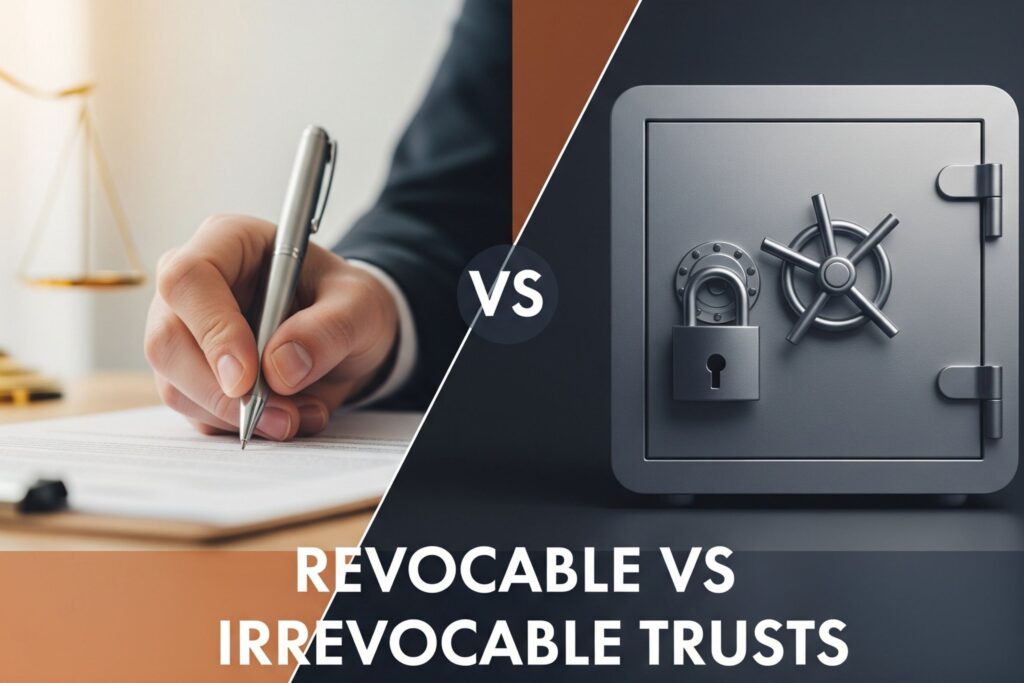
Ever find yourself nodding along when someone says, “You should really set up a trust,” while secretly wondering if that means you’re about to be adopted by a billionaire?
Same.
Let’s break it down together—with no legalese, no scare tactics, and just enough humor to keep you awake through the topic of trust structures. Because while this may not be dinner party material, it is one of the most important decisions you can make to protect your people, your peace of mind, and your legacy.
So… What Is a Trust?
At its core, a trust is just a legal container where you place assets (money, property, investments, etc.) so that someone else (the “trustee”) can manage them on behalf of someone else (your “beneficiaries”).
Think of it as a well-labeled, future-proof Tupperware container for your life’s work—except instead of leftovers, it’s holding your house and your bank accounts.
There are two main types: revocable and irrevocable. Let’s explore what revocable vs irrevocable trust really means, who needs which one, and how to avoid putting your family through unnecessary headaches later on.
Revocable Trusts: The Flexible Favorite
A revocable living trust is a trust you can change—or even cancel—while you’re alive. You’re usually the trustee and the beneficiary to start, which means you stay in control of everything… until you don’t want to (or can’t).
✅ Pros:
- Avoids probate (no court delays or public proceedings)
- Flexible and editable—you can change it anytime
- Great for incapacity planning—your successor trustee can step in if needed
- Keeps things private
⚠️ Cons:
- Won’t protect you from creditors or taxes
- Requires you to retitle assets into the trust (most people forget this part)
Who it’s right for:
- Parents with kids who’d be too overwhelmed to manage probate
- People who like control (hi, fellow Type A’s 👋)
- Anyone planning for potential incapacity (Alzheimer’s, strokes, and life’s curveballs)
If you want something that’s private, probate-free, and changeable as life evolves, the revocable trust is your best friend. It’s like the yoga instructor of estate planning—flexible, grounded, and great under pressure.
Irrevocable Trusts: The Fort Knox of Planning
An irrevocable trust is, well… kind of like getting a tattoo. Once it’s set up, it’s not easily changed (unless you jump through serious legal hoops). You’re giving up control—but in exchange, you gain some serious benefits.
✅ Pros:
- Asset protection—creditors can’t touch what’s in the trust
- May reduce estate taxes for high-net-worth families
- Keeps assets out of your taxable estate
- Can be used to set up life insurance trusts, Medicaid planning, or support for a child with special needs
⚠️ Cons:
- No take-backs—once it’s done, it’s done
- More complex and costly to set up and maintain
- You lose control of assets placed in the trust
Who it’s right for:
- High-net-worth individuals trying to reduce estate taxes
- Families navigating long-term care or Medicaid eligibility
- People with lawsuits, business liability, or family drama on the horizon
This one’s for folks who are ready to lock things down for good. It’s the armored truck of trusts—strong, secure, but not for casual use.
Quick Comparison: Revocable vs Irrevocable Trusts
|
Feature |
Revocable Trust |
Irrevocable Trust |
|
Can you change it? |
Yes, anytime |
No, not easily |
|
Probate avoidance? |
✅ Yes |
✅ Yes |
|
Creditor protection? |
❌ No |
✅ Yes |
|
Estate tax reduction? |
❌ No |
✅ Possible |
|
Ideal for… |
Flexibility + control |
Protection + tax strategy |
The Real Question: What Are You Trying to Protect?
If your goal is to:
- Avoid probate headaches
- Keep things private
- Plan ahead for your kids or aging parents
Then a revocable trust is likely enough. Add a backup (“pour-over”) will and you’re good to go. A pour-over will simply says: “Anything I didn’t put into my trust during my lifetime? Put it there now.” It’s your legal safety net for anything you forget to title properly.
But if your goal is:
- To protect assets from lawsuits or nursing home spend-downs
- To reduce a multi-million dollar estate for tax purposes
- To preserve benefits for a loved one with special needs
Then it’s time to talk irrevocable trust with a qualified estate attorney.
My Take? Start With What You Can Control.
When both of my in-laws passed away unexpectedly in 2024, we were left scrambling to figure out what existed, what didn’t, and how to piece together a plan from the fragments. A trust—any kind—would have saved us time, stress, and a whole lot of sleepless nights.
That’s why I believe planning is one of the greatest acts of love. It’s not about locking everything down—it’s about leaving behind clarity.
Start where you are. Pick the trust that fits your needs. And if you’re still not sure which one makes sense?
Let’s talk. I’ll walk you through it.
FAQ: Revocable vs Irrevocable Trust
What is the difference between a revocable and irrevocable trust?
A revocable trust can be changed during your lifetime—you stay in control of the assets. An irrevocable trust generally can’t be changed, but it offers benefits like asset protection and potential tax savings.
Do I need a will if I have a trust?
Yes. A pour-over will is recommended alongside a revocable trust. It directs any assets left out of your trust into it after death—helping avoid loose ends (and probate delays).
Which one is better for avoiding probate?
Both types of trusts help avoid probate for assets placed into them properly. But revocable trusts are more commonly used for this purpose in everyday estate plans.
Can a trust protect assets from lawsuits?
Only an irrevocable trust offers that level of protection—because you no longer legally own the assets.
Want Help Getting Started?
SageVault offers personalized consulting for legacy planning—including trust education, document prep support, and guided family conversations.



